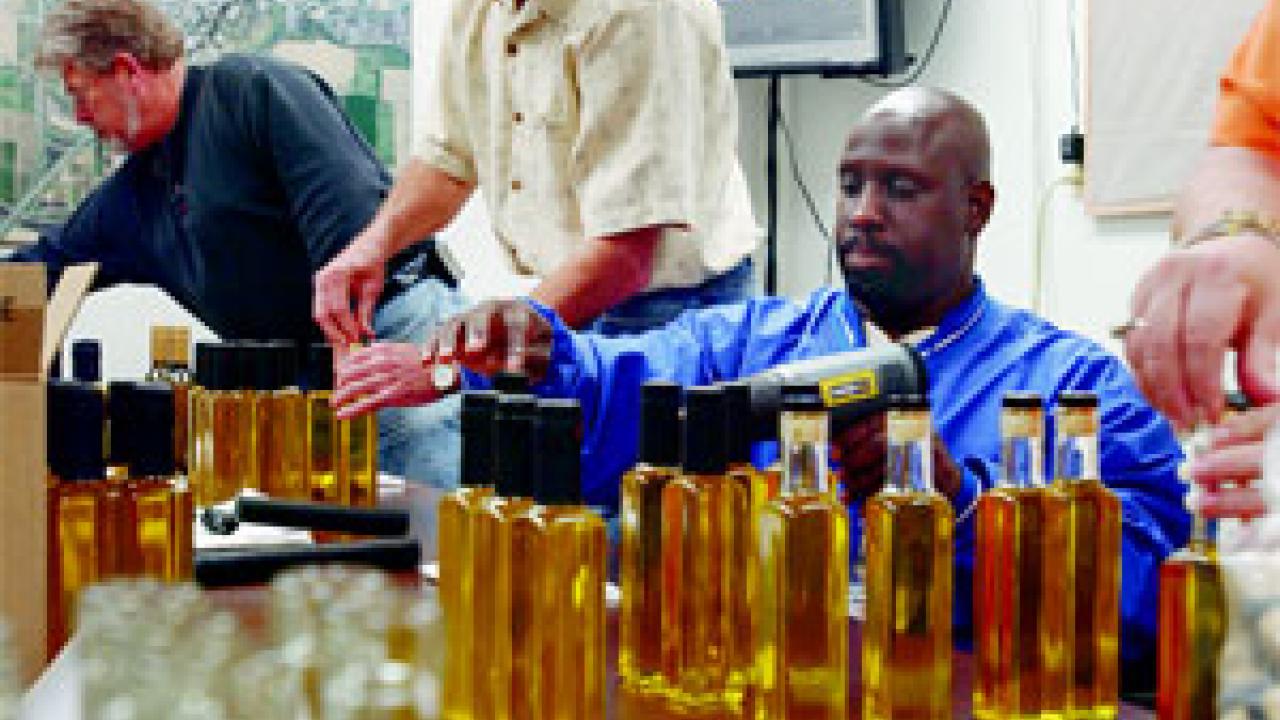Where else but on a college campus could Sal Genito get away with a sales pitch like this: Buy UC Davis olive oil, the oil that makes smart people even smarter.
But Genito, the campus grounds manager, has the passion, the facts and – yes, even the brand new, homegrown extra virgin olive oil — to back up his claim. After years of watching the campus' more than 2,000 olive trees just dump their fruit on the ground, after paying thousands each year to clean up the mess, and concerned about safety and campus liability exposure from claims filed by bicyclists who skidded out on the squished, greasy olives, Genito figured there had to be a better way — press and bottle those costly olives into a revenue stream.
He will have the opportunity to test his theory and his olive oil this Picnic Day weekend when he offers the thousands of visitors who converge on the campus complimentary tasting of five varietals of UC Davis' own freshly bottled olive oil. His "laboratory" will be located at the south side of the Memorial Union. For those favorably impressed with the campus's maiden 2005 vintage, a limited number of bottles will be available for sale.
For Genito, this is a can't lose situation. He estimates that the grounds division spends about $60,000 a year maintaining the campus' majestic but messy stands of olive trees. But according to a recent feasibility study — which he convinced a local olive oil hobbyist and former legislative consultant to prepare for free — the campus could save that expense, plus collect some $11,375 each year in revenue from the sale of about 125 gallons of olive oil.
Of that total, $4,485 would go to the costs of harvesting, pressing and bottling the olive oil. The remaining $6,875 would be used for marketing, promotion and research to help the industry find better ways to harvest, produce and dispose of waste products from the highly valued oil through the fruit and nut tree teaching and research programs in the new Department of Plant Sciences — or, in Genito's words, help to make some of the world's smartest agricultural minds on campus even smarter.
"And that's barely even trying," adds Genito, who grew up helping on his grandfather's farm in Fresno and eventually ran his own small truck farm to help pay his way through college. "If we wanted to, we could make $40,000 from (selling) fresh olives and oil. But we're not looking to be anything other than special and distinctive and cover our costs, and give the campus something they can be proud of and use."
For now. Already there is a small-scale marketing plan in the works. Fortified from a strong showing at a recent international agricultural exposition in Sacramento, Genito next spring hopes to place the UC Davis olive oil on shelves in a few select gourmet markets, including Dean & DeLuca in Napa, Corti Bros. and David Berkley Fine Foods in Sacramento and the Nugget markets locally.
And that's before a team over at the Graduate School of Management begins its efforts in earnest. Led by management professor Eitan Gerstner, a handful of graduate students will be preparing a full-blown marketing plan for UC Davis olive oil as part of their course work, including an analysis of who the customers are, the competition, the status of the market, how to price it and how to promote it.
"I thought it was a great idea," says Charles Madison, one of the graduate students involved. "I'm interested in cooking, as well, and when I heard they were trying to keep the olive oil within UC Davis, I leapt at the chance."
Gerstner and his students were not the only on-campus talent that Genito has tapped to get his project off the ground. He also turned to Laurie Lewis, a graphic designer in University Communications, to design the labels for the bottles.
"I think this is a great way to market UC Davis and to connect people to the campus in ways that they would not normally be connected," says Genito. "The response to this so far has been overwhelming."
Media Resources
Mitchel Benson, (530) 752-9844, mdbenson@ucdavis.edu
